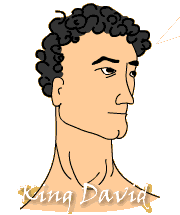
Last in the Apocrypha, but certainly not least, is Psalm 151. While the Masoretic text contains only 150 Psalms, Greek manuscripts, known as the Septuagint, as well as one of the Dead Sea Scrolls, also record this seven-versed song of praise attributed to the Bible's most famous underdog: King David.

That's right Jeff. In this song I point out that even though I was the youngest and certainly not the best looking of my brothers, God chose to anoint me shepherd of the people. It shows that God looks for inner qualities rather than outside appearances.

Good point King David. I would also like to cite the gnarly passage which retells your most famous victory over Goliath of Gath:
"I went forth to meet the Philistine, and he cursed me in the name of his idols. But I drew his own sword, and I beheaded him, and removed reproach from the children of Israel" (6-7).

And so it seems from Psalm 151 and Judith, the main message of the Apocrypha is that nothing motivates one's troops to fight like cutting off the head of the most powerful member of one's enemy.

Actually Methuselah, I prefer to think that the Apocryphal stories teach us that life in and after the exile were difficult. Assimilation and losing culture were real threats. But with innovation, and faith, redemption was a real possibility.

Well put, Jeff my darling. We sure hope you enjoyed this section of BibleDudes, and learned why we think the stories in the Apocrypha are real hidden treasures. In the next section we'll explore the New Testament and learn about Jesus, Paul, and the early Christian Church.